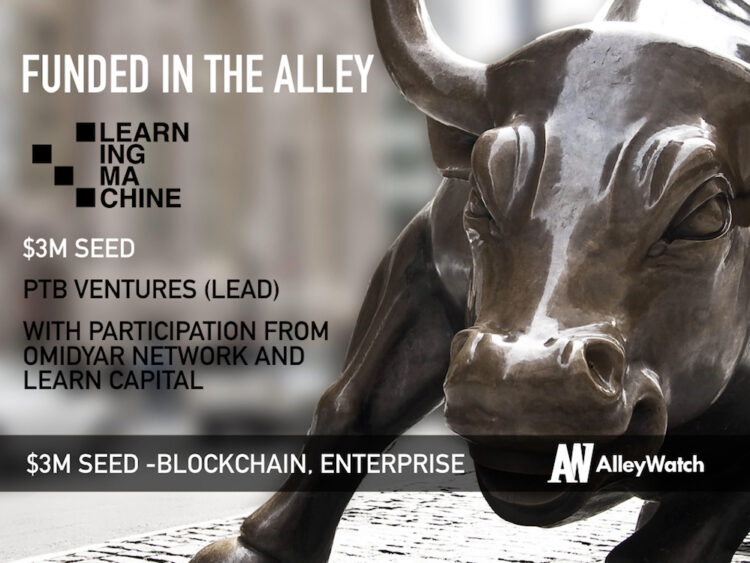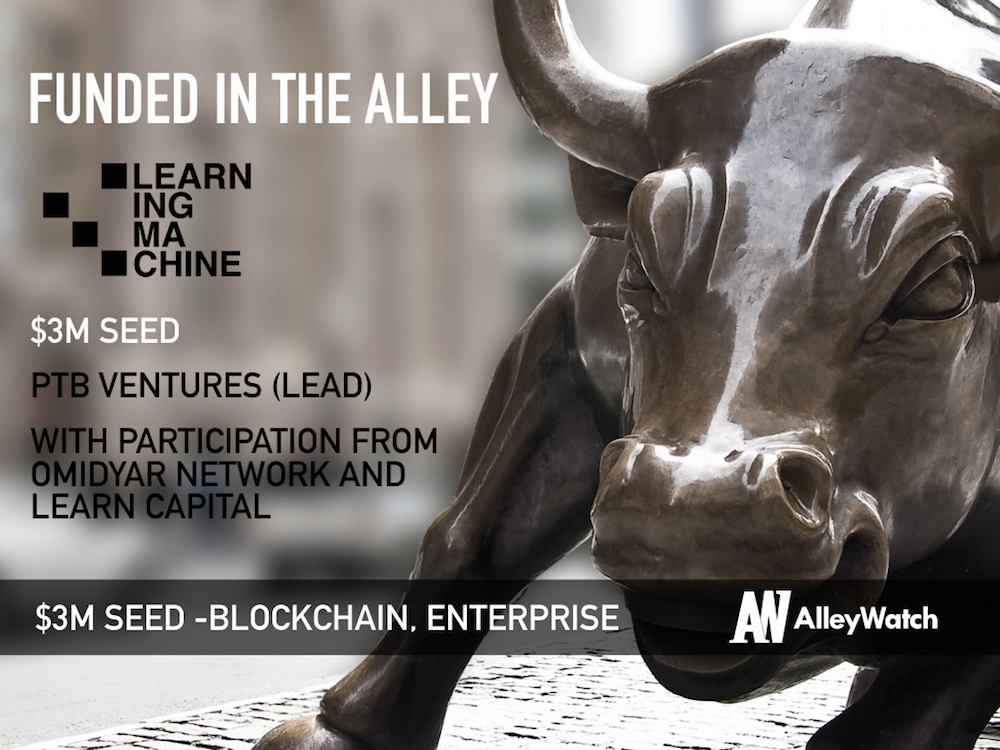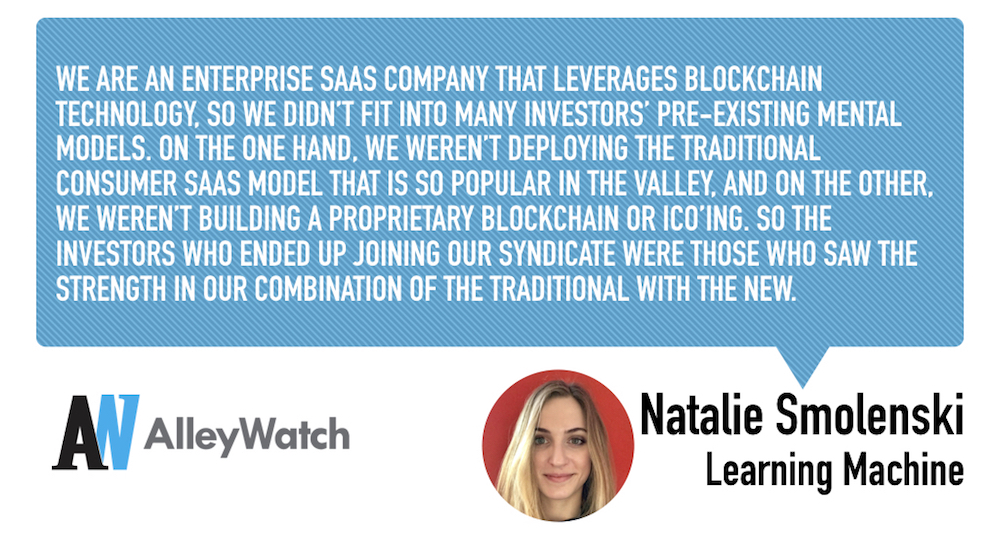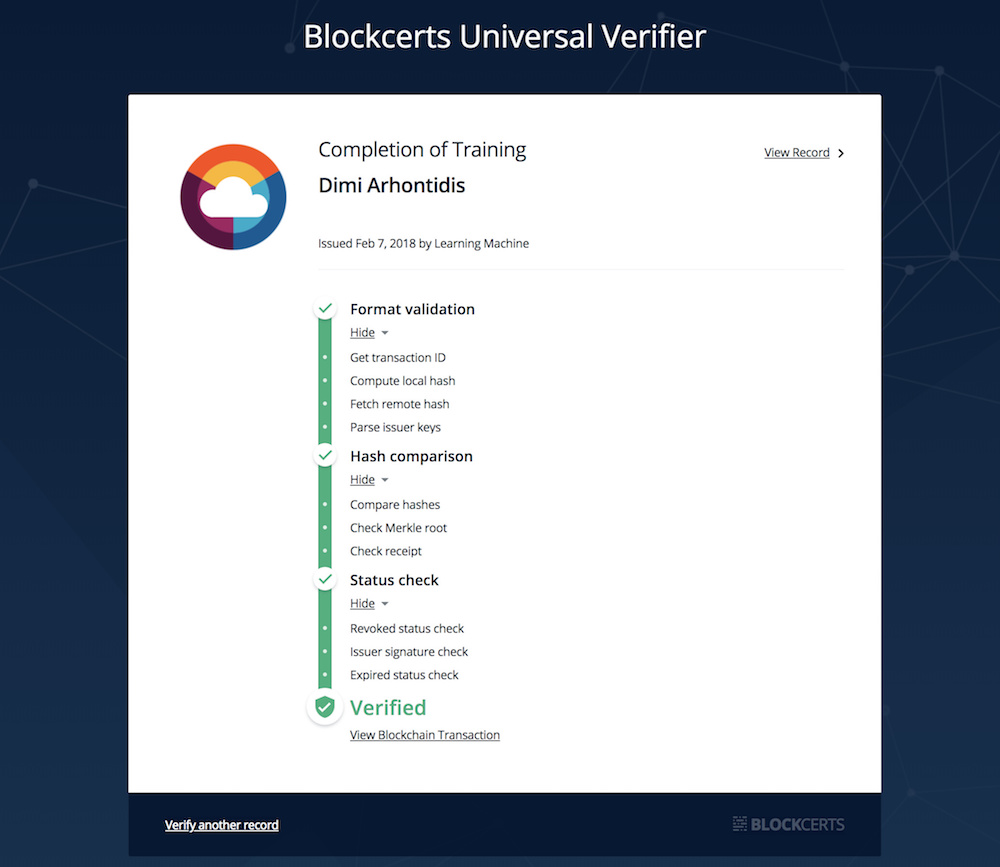The personal identity market is estimated to be worth around $9.6B and with the invention of blockchain, the personal identity market may experience unprecedented growth. Leading the charge is Learning Machine. The startup helps large corporations and institutions verify their own records keeping them tamper proof, recipient owned, and independently verifiable. With success in governmental, medical and educational institutions the company hopes to become the world’s first universal verification tool.
AlleyWatch had the chance to speak with Natalie Smolenski to learn more about how Learning Machine is disrupting the identity market and its recent round of funding.
Who were your investors and how much did you raise?
Learning Machine raised a $3M Series Seed led by New York-based PTB Ventures and including Omidyar Network and Learn Capital.
Tell us about Learning Machine.
Learning Machine sells an enterprise blockchain records platform to governments, corporations, and educational institutions looking to issue universally verifiable documents using the blockchain as a secure anchor of trust.
 What inspired the start of Learning Machine?
What inspired the start of Learning Machine?
Learning Machine grew out of another company, which makes applicant-tracking systems primarily used by higher education institutions. One of our customers was MIT, and we felt firsthand the pain of trying to verify official documents as part of the application process. To solve this problem, Learning Machine collaborated with the MIT Media Lab to build Blockcerts, the world’s only open standard for issuing, receiving, and verifying credentials using the blockchain as a secure anchor of trust. Then Learning Machine took Blockcerts to market by building and selling applications that make it really easy for any institution to issue Blockcerts at scale. That way, customers get the benefits of an open standard combined with the benefits of a best-in-class, supported enterprise software solution.
How is Learning Machine different?
Blockcerts created the world’s first Universal Verifier—the first free and open tool that verifies the authenticity of any document (Blockcert) issued by any institution anywhere in the world. The Verifier is available at Blockcerts.org as both an SDK and a service. And because the verifier is open source, Blockcerts remain verifiable whether or not they were issued using the open source project, Learning Machine’s platform or some other vendor’s system—and whether or not the issuer or their vendor continues to operate. This is key.
Any type of document can be issued as a Blockcert—driver’s licenses, professional licenses, passports, academic degrees, transcripts, and more. This means there is now a way for individuals to instantly verify any claim made about themselves without installing any proprietary software, buying tokens, or waiting on an issuing institution or software vendor. Individuals can take their identity, learning, and work experience with them anywhere they go—and best of all, they can prove they own all of these digital claims about themselves, drastically reducing opportunities for identity theft and fraud.
For issuing institutions, we don’t pick blockchain winners—Blockcerts can be issued to any chain, meaning customers can use the blockchain of their choice. This affords us a flexibility that very few other blockchain companies have.
What market does Learning Machine target and how big is it?
The total addressable market for digital identity is so large that it hasn’t been properly documented. The Personal Identity market has been estimated at about $9.6 billion, but adjacent industries include: Human Capital Management ($20B); Electronic Medical Records ($28B); and Inspection & Certification ($184B).
What’s your business model?
Learning Machine sells best-in-class enterprise credential issuing solutions to large institutional clients like governments, corporations, and universities.
Why are governments and school systems well poised to use blockchain technology?
Governments and school systems are the largest issuers of high-stakes records that need to be verified with high levels of certainty all over the world. The blockchain is fundamentally a verification infrastructure. Accordingly, using the blockchain to verify claims is an intuitive application of the technology for governments and school systems.
What was the funding process like?
It’s always a process of finding fit. We actually met our lead investor, Dave Fields from PTB, through an early pilot customer, the Federation of State Medical Boards. When we met Dave it was clear that there was immediate resonance between our vision and approach to running a successful business. From there, building the syndicate took on its own momentum.
What are the biggest challenges that you faced while raising capital?
We are an Enterprise SaaS company that leverages blockchain technology, so we didn’t fit into many investors’ pre-existing mental models. On the one hand, we weren’t deploying the traditional Consumer SaaS model that is so popular in the Valley, and on the other, we weren’t building a proprietary blockchain or ICO’ing. So the investors who ended up joining our syndicate were those who saw the strength in our combination of the traditional with the new. We make the adoption of blockchain technology super easy by leveraging already-existing business processes and familiar ways of interfacing with technology such that you don’t need to understand anything about blockchain technology to see the value of the solution.
What factors about your business led your investors to write the check?
We are deeply committed to the principle of self-sovereign digital identity, meaning that the individual should own and control their data. This is a prerequisite for both inclusion in the 21st century economy and making sure that inclusion doesn’t come at the price of individual emancipation. However, it’s not enough to have principles; you also need to have a sound business model if you want your values to translate into mass adoption and truly transform the world. Our investors saw that combination of principle, strategy, and operational skill in Learning Machine.
What are the milestones you plan to achieve in the next six months?
In the next six months, we plan to level up the Issuing System to include deeper multi-chain issuance and the ability to issue identity documents (i.e. driver’s licenses) and academic transcripts. We have some major national blockchain credentialing initiatives underway as well. Learning Machine is building a reputation as not only the best-in-class issuer of standards-based blockchain credentials, but as an advisory partner to our clients as they navigate wider blockchain implementations.
What advice can you offer companies in New York that do not have a fresh injection of capital in the bank?
Invest in the one thing you do better than anyone else,and make it super simple. Focus on the customers who love you and can pay you. You win sustainability from recurring revenue and keeping high LTV customers happy.
Where do you see the company going now over the near term?
Learning Machine aims to remain the world’s primary provider of interoperable, independently verifiable, recipient owned digital identity solutions. The objective now is to grow, grow, grow all around the world.
Where is your favorite bar in the city for an after work drink?
I’ve found myself gravitating over to Dante, off of Macdougal and Bleecker, again and again. Their Negroni list is jaw dropping.





